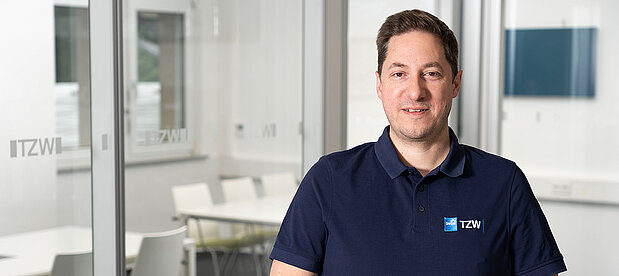


![[Translate to English:] Prüfstelle-Produktprüfung_Teststand Test centre and product testing](/fileadmin/_processed_/0/9/csm_TZW-Karlsruhe_Pruefung_Geraete-Teststand_377188946c.jpg)

















Providing drinking water of highest quality at the tap is one of the primary goals of water supply. This places high requirements on the drinking water network operator. Despite all efforts, it is not possible to entirely exclude variations in quality during water distribution. Targeted measures need to be taken to control and eliminate abnormalities. These measures frequently require detailed knowledge of the complex processes involved in the distribution system. TZW works hard to clarify these processes using specialist methods of analysis and concepts. We offer water supply companies consultation on all aspects of drinking water quality assurance in the distribution system and support them in the development of specific network management strategies.
Pitting corrosion and perforations in galvanised steel, copper and stainless steel can cause damage to water supply systems. We have in-depth technical expertise on this subject and offer comprehensive damage investigations.
Condition-based flushing of drinking water networks
Brown or turbid water is a frequent quality issue in drinking water distribution and is caused by the mobilisation of deposits in the pipes. TZW has developed the concept of condition-based network flushing. This is based on flushing individual network sections once deposit build-up has reached a critical potential. TZW offers its support for the implementation of a condition-based flushing strategy. This includes developing flushing schedules, conducting, evaluating and scientifically assessing the flushing processes as well as defining tailored flushing intervals and districts.
Assessment of corrosion inhibitors
Corrosion inhibitors are primarily used in water distribution with the aim of avoiding rusty water. Continuous turbidity measures are ideal for assessing the need to add inhibitors or to optimise the inhibitor composition as well as the additive quantity under the specific distribution system conditions. The corrosion behaviour of the pipe materials in the network can be evaluated in detail using turbidity curves. TZW defines the representative measurement points, provides the measuring instruments and prepares recommendations on inhibitor use after evaluating the turbidity curves.
Identification of microbiological contamination points
In practice, routine testing is frequently revealing isolated findings of coliform bacteria or enterococci. Findings may relate to an indicator for latent pollution or for a sporadic contamination. TZW established the following approaches to quickly and clearly identify contamination points, which have been tried and tested in a range of cases in practice:
Preparation of schedules of measures and action plans
According to Section 16 (5) of the German Drinking Water Ordinance, every water supply company is obliged to create a schedule of measures that considers the regional water supply conditions. It is particularly recommended that water supplies without continuous disinfection also create action plans based on the DVGW worksheet W 1020 in addition to a schedule of measures. These contain rules on what to do if microbiological limits are exceeded with the aim of supplying consumers hygienically flawless drinking water at all times without any restrictions on use.
Cause analysis for non-compliance of microbiological limit values in drinking water
Microbiological problems in drinking water can have a variety of causes. TZW offers consultation for water supply companies, authorities, industry and other partners on microbiological limit breaches and hygienic problems in drinking water treatment, distribution and installation.
Monitoring invertebrates
Anomalies caused by invertebrates can also arise in water distribution. Using a filtration system developed by TZW, invertebrates are enriched as part of network irrigation and these are then quantified and identified in the lab. As part of a systematic procedure, the exact population density per pipe section is determined and corrective measures are devised and/or evaluated.
Cause analysis for corrosion damage
Corrosion damage negatively impacts water quality and in the worst case it may cause water leaks. These issues often cause consequential damage to buildings. In addition to a thorough survey taking into account all associated aspects, we conduct corrosion-chemical investigations and cut materials which help to determine the type and cause of damage for the most diverse metallic and non-metallic materials.
Fourier transform infra-red spectrometer (ftir spectrometer)
Wricke, B.; Korth, A.; Richardt, S.: Minimierung sedimentbürtiger Gütebeeinträchtigungen durch modellgestützten Rohrnetzbetrieb. Veröffentlichungen aus dem Technologiezentrum Wasser Karlsruhe [Minimisation of sediment-induced quality issues by means of model-based pipeline operation. Publications from TZW Karlsruhe]. Volume 48, (2010)
Korth, A., Donath, O.: Zustandsorientierte Spülstrategie für Trinkwassernetze [Condition-based flushing strategy for drinking water networks]. Energie- und Wasserpraxis, 11/2018, (2018), p. 38-41
Wricke, B., Korth, A.: Hygienische Sicherheit im Verteilungsnetz – Teil 2: Erkennen und Beseitigen der Ursachen mikrobiologischer Güteveränderungen [Hygienic safety in distribution networks – Part 2: identification and elimination of the causes of microbiological quality changes].. Energie- und Wasserpraxis 11/2016, (2016), p. 32-41
Korth, A. and Lohmann M.: Bewertung der Wirkung von Korrosionsinhibitoren im Verteilungsnetz
Veröffentlichungen aus dem Technologiezentrum Wasser Karlsruhe [Assessment of the effect of corrosion inhibitors in distribution networks. Publications from TZW Karlsruhe]. Volume 82, (2018)
Hügler, M., Petzoldt, H., Korth, A.: Innovativer Ansatz zur Ursachenanalyse mikrobiologischer Belastungen. Veröffentlichungen aus dem Technologiezentrum Wasser Karlsruhe [Innovative approach for the cause analysis of microbiological pollution. Publications from TZW Karlsruhe]. Volume 70, (2015), p. 45-57
Volumes from the TZW publication series can be purchased here.
Contact



Projects
Flexilienz stands for a resilient (resistant) and flexible drinking water supply in times of climate change and the energy transition. The project…
Read moreThe research project is developing practical recommendations for the operation of interconnection pipelines in order to strengthen the resilience of…
Read moreThe "Heat extraction" research project is investigating the utilisation of heat from drinking water distribution networks in order to review the…
Read more